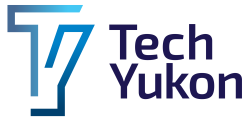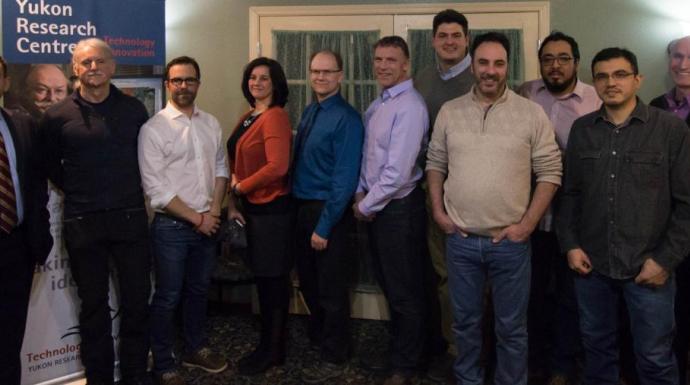The weekend of February 11-12 was a working weekend for TechYukon. Six local technology entrepreneurs went through their paces at our second Startup Checkpoint event, reality-checking their product ideas and market expectations, and developing a sales pitch to deliver to a panel of expert judges. The process is kind of a kinder, gentler Dragons’ Den exercise, with more help up front, and a more supportive pitch environment.
The candidates and their products, listed in alphabetical order, were as follows:
Camilo Rivera and Marcos Castillo, of Apprendo Yukon. The recently-established Yukon company has an in-market online Learning Management System focused on corporate training, featuring a suite of tools that make it, by their estimate, more than 80% faster to train staff, and also much faster to create and upload content. Originally developed in Mexico, the system already has a large number of corporate users, but mostly in Spanish-speaking countries. Apprendo Yukon is looking to develop technologies (such as chatbots) that will further enhance its functionality, and is looking for mentoring in the marketing of its product in the English-North America market
Daren Gallo, who currently works at Yukon College as an IT practitioner, and who has several years of experience as a professional photographer, has a product which is still in its ideational stage: a web-based photographic documentation service for contractors in building construction. This would involve a website where digital plans could be stored, along with professional-level photographs taken in the course of the construction. This documentation would provide large cost savings in addressing any problems in wiring, plumbing or other such systems, since the photos would show precisely where those systems are located in the walls as built.
Jim Coates is the proprietor of Kryotek, a local company specializing in dealing with permafrost in the highway and building construction industries. He has developed a device that can monitor sensors in the ground under roadways or buildings that will send out warning messages by text or e-mail when a monitored area of permafrost is starting to melt, and a full alert when that melting has reached the critical stage. His technology provides this kind of service at a hardware and installation cost vastly lower than competing services. He has a fully developed working model of the device, and some customers ready to purchase it, but is seeking marketing and manufacture mentoring.
Lisa Kanary currently works at the Yukon government Bureau of Statistics, and has a PhD in mathematics, with a good deal of experience in data analysis. Her idea, like Daren Gallo’s is also in the ideational stage. It involves using data analysis technologies to make the data you are getting from your fitness tracking device more meaningful to you and to your health and fitness goals – moving beyond just the raw numbers of how many steps you took or how long you slept. Her ask was for assistance in developing the technology to drive this analysis, and mentoring assistance to help her best structure the business, either as an operating company, or a product to be sold or licensed to other companies
Simon Lapointe, of 3Pikas, a local planning and technology startup, has a working online service called Civicly, which addresses the problem of acquiring and making use of public input on things like land use or urban development proposals. Old-fashioned, town-hall style consultations sessions are problematic, because participation rates are often low, and sometimes skewed by attendees with particular interests in the question at hand. Civicly functions as a platform for on-line intake of public feedback. It also provides municipalities, regional governments or consultants with data analysis tools to use that input to arrive at effective development decisions. Civicly is currently in use by a number of governmental and consulting agencies, but at the moment functions more as a service, featuring a good deal of consulting support, rather than as a stand-alone product. 3Pikas is seeking mentoring on how to effect that change, and market the resulting product.
Stephan Bardubitzski is the proprietor of mobiTec, a mobile application development firm with a range of existing app products. He has developed a new application called “Local is Smart” to help small to midsize businesses in smaller cities and towns to engage with the public through a phone app, letting them know about any special sales or offerings that may be of interest to them. Since the emphasis is on “buy local,” the app is targeted for communities of under 100,000 people and for businesses local to that particular community. The app is already fully developed, and mobiTec is looking for assistance in getting the product into market.
This year’s crop of participants was remarkable in that, though they covered the whole span from initial-idea to in-market-and-selling levels, they were all such strong candidates that we had to abandon our first idea of choosing the top three or four for a majority of our follow-up support. We decided it made more sense to forgo any pre-established prize and support levels and instead consult with each of the participants about the nature and timing of the support they needed, and try to fit as many of those needs as possible within our resources.
We would like to thank Bernd Petak of Bernd Petak Consulting for developing and presenting the workshop session. We would also like to thank Alastair Smith of Proskida, Jonathan Baynes of Yukon College, and Ron Daub of Vuntut Limited Partnership for their great feedback on the pitches. Further thanks to Yukon government Department of Economic Development, the Cold Climate Innovation Centre of Yukon College, and Northwestel for their funding and sponsorship.
Chris Lane, President of TechYukon, and Rick Steele, Executive Director, would also like to thank Minister Ranj Pillai and Minister Richard Mostyn for their support for this event, and their appearance at our kick-off social gathering.

